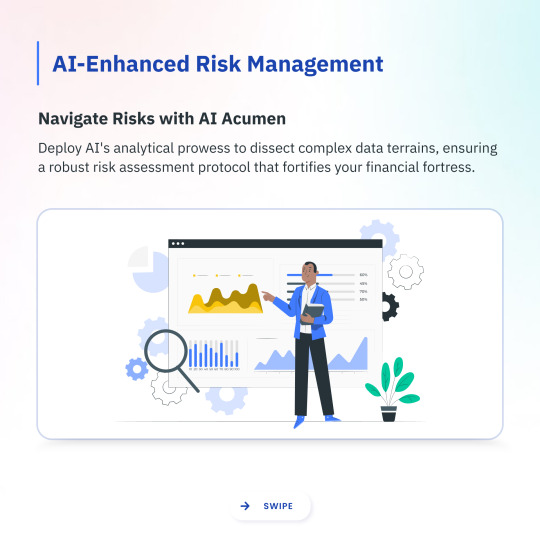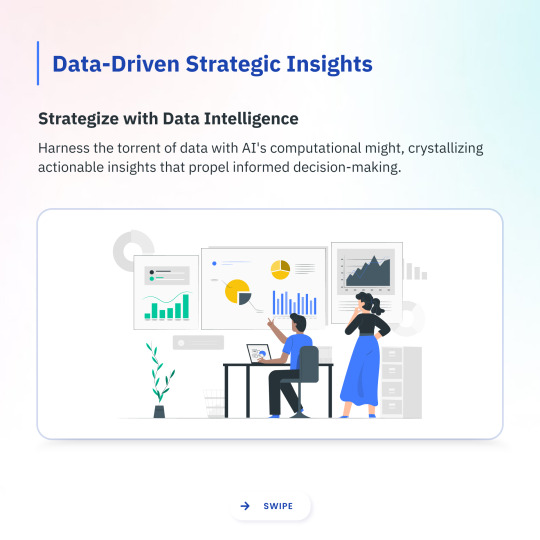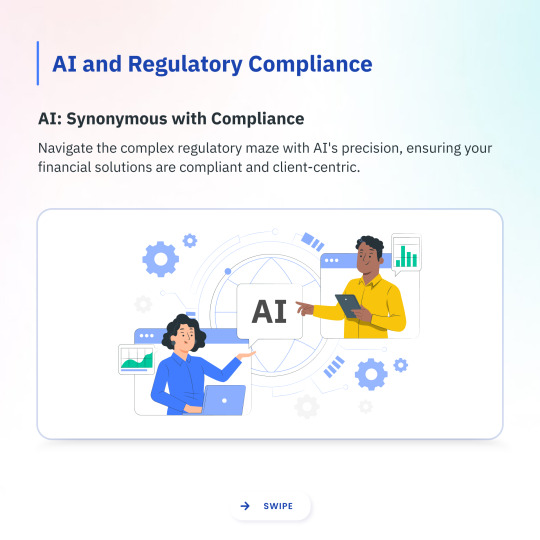#Artificial Intelligence in FinTech
Explore tagged Tumblr posts
Text
Revolutionizing Finance: Unleashing the Potential of Artificial Intelligence in Fintech
Explore the cutting-edge intersection of finance and technology as we delve into the blog, "Harnessing the Power of AI in Fintech." Discover how artificial intelligence is reshaping the financial landscape, from intelligent algorithms optimizing trading strategies to predictive analytics revolutionizing risk management. Gain insights into the transformative impact of AI on customer experiences, fraud detection, and regulatory compliance. Join us on a journey through the innovative applications of AI in fintech, unraveling the complexities and unlocking unprecedented opportunities for the future of finance.
Link: https://www.sganalytics.com/blog/harnessing-the-power-of-AI-in-fintech/
0 notes
Text
The Role of Artificial Intelligence in FinTech: Revolutionizing Customer Experience and Risk Management Discover the transformative power of Artificial Intelligence in FinTech. Explore how AI is revolutionizing financial technology, improving efficiency, enhancing security, and enabling personalized experiences. Stay ahead of the competition with our comprehensive insights on the role of AI in FinTech.
#Artificial Intelligence in FinTech#FinTech trends in 2023#role of AI in fintech#benefits of AI in fintech exceed
0 notes
Text
How AI is impacting & transforming the face of Fintech?
Do you want to revolutionize customer experience and risk management with FinTech? Discover the power of artificial intelligence, which is rapidly boosting the adoption of Fintech. The use of Artificial Intelligence in FinTech is changing how financial institutions run their businesses and improving the efficiency, personalization, and security of their services. Learn the benefits of using AI in FinTech and have a glimpse of the bright future it has to offer to the Industry. So, if you are all set to share your billion-dollar FinTech idea with the audience, get in touch with Protonshub Technologies to avail the best services.
#Artificial Intelligence in FinTech#FinTech trends in 2023#role of AI in fintech#benefits of AI in fintech exceed
0 notes
Text
Youngsters in India now prefer entrepreneurship over MNC jobs: RBI governor Malhotra
NEW DELHI: Reserve Bank of India (RBI) Governor Sanjay Malhotra said that the mindset of India’s young generation has changed remarkably over the years, with many now preferring to become entrepreneurs rather than seeking jobs in multinational companies (MNCs). Highlighting the shift, Malhotra said, “When I left college, getting a job in a MNC was the preferred choice. None took up the challenge…
#Aadhaar#artificial intelligence#DBT#Digital India#entrepreneurs#fintech#governor#india#job creators#job-seekers#jobs#MNCs#Public tv english#RBI#renewable energy#Reserve Bank#Sanjay Malhotra#startup#unicorns#young generation
2 notes
·
View notes
Text

The Great Reset / The World Game: Utopia or Oblivion ? Buckminster Fuller's The World Game: Utopia or Oblivion ? Swords to plowshares solutions. Nobel Prize winning Economist Milton Friedman "only a crisis brings about change and makes the politically impossible become the politically inevitable" #IP #DeFi #patent #patentlaw Github: http://github.com/Beacon-Heart
#blockchain#cryptocurrency#bitcoin#economic collapse#econometrics#economics#sustainable#reset#money#fintech#quantum computing#artificial intelligence
2 notes
·
View notes
Text
How AI is Reshaping the Future of Fintech Technology

In the rapidly evolving landscape of financial technology (fintech), the integration of artificial intelligence (AI) is reshaping the future in profound ways. From revolutionizing customer experiences to optimizing operational efficiency, AI is unlocking new opportunities for innovation and growth across the fintech ecosystem. As a pioneer in fintech software development, Xettle Technologies is at the forefront of leveraging AI to drive transformative change and shape the future of finance.
Fintech technology encompasses a wide range of solutions, including digital banking, payment processing, wealth management, and insurance. In each of these areas, AI is playing a pivotal role in driving innovation, enhancing competitiveness, and delivering value to businesses and consumers alike.
One of the key areas where AI is reshaping the future of fintech technology is in customer experiences. Through techniques such as natural language processing (NLP) and machine learning, AI-powered chatbots and virtual assistants are revolutionizing the way customers interact with financial institutions.
Xettle Technologies has pioneered the integration of AI-powered chatbots into its digital banking platforms, providing customers with personalized assistance and support around the clock. These chatbots can understand and respond to natural language queries, provide account information, offer product recommendations, and even execute transactions, all in real-time. By delivering seamless and intuitive experiences, AI-driven chatbots enhance customer satisfaction, increase engagement, and drive loyalty.
Moreover, AI is enabling financial institutions to gain deeper insights into customer behavior, preferences, and needs. Through advanced analytics and predictive modeling, AI algorithms can analyze vast amounts of data to identify patterns, trends, and correlations that were previously invisible to human analysts.
Xettle Technologies' AI-powered analytics platforms leverage machine learning to extract actionable insights from transaction data, social media activity, and other sources. By understanding customer preferences and market dynamics more accurately, businesses can tailor their offerings, refine their marketing strategies, and drive growth in targeted segments.
AI is also transforming the way financial institutions manage risk and detect fraud. Through the use of advanced algorithms and data analytics, AI can analyze transaction patterns, detect anomalies, and identify potential threats in real-time.
Xettle Technologies has developed sophisticated fraud detection systems that leverage AI to monitor transactions, identify suspicious activity, and prevent fraudulent transactions before they occur. By continuously learning from new data and adapting to emerging threats, these AI-powered systems provide businesses with robust security measures and peace of mind.
In addition to enhancing customer experiences and mitigating risks, AI is driving operational efficiency and innovation in fintech software development. Through techniques such as robotic process automation (RPA) and intelligent workflow management, AI-powered systems can automate routine tasks, streamline processes, and accelerate time-to-market for new products and services.
Xettle Technologies has embraced AI-driven automation across its software development lifecycle, from code generation and testing to deployment and maintenance. By automating repetitive tasks and optimizing workflows, Xettle's development teams can focus on innovation and value-added activities, delivering high-quality fintech solutions more efficiently and effectively.
Looking ahead, the integration of AI into fintech technology is expected to accelerate, driven by advancements in machine learning, natural language processing, and computational power. As AI algorithms become more sophisticated and data sources become more diverse, the potential for innovation in fintech software is virtually limitless.
For Xettle Technologies, this presents a unique opportunity to continue pushing the boundaries of what is possible in fintech innovation. By investing in research and development, forging strategic partnerships, and staying ahead of emerging trends, Xettle is committed to delivering cutting-edge solutions that empower businesses, drive growth, and shape the future of finance.
In conclusion, AI is reshaping the future of fintech technology in profound and exciting ways. From enhancing customer experiences and mitigating risks to driving operational efficiency and innovation, AI-powered solutions hold immense potential for businesses and consumers alike. As a leader in fintech software development, Xettle Technologies is at the forefront of this transformation, leveraging AI to drive meaningful change and shape the future of finance.
#Fintech Technologies#Fintech Software#Artificial Intelligence#Finance#Fintech Startups#technology#ecommerce#fintech#xettle technologies#writers on tumblr
6 notes
·
View notes
Text
youtube
#industrial ar#augmented reality#Virtual reality#VR#immersive#innovation#edtech#fintech#artificial intelligence#VR travel#MR for manufacturing#Youtube
2 notes
·
View notes
Text
Romanian AI Helps Farmers and Institutions Get Better Access to EU Funds - Technology Org
New Post has been published on https://thedigitalinsider.com/romanian-ai-helps-farmers-and-institutions-get-better-access-to-eu-funds-technology-org/
Romanian AI Helps Farmers and Institutions Get Better Access to EU Funds - Technology Org
A Romanian state agency overseeing rural investments has adopted artificial intelligence to aid farmers in accessing European Union funds.
Gardening based on aquaculture technology. Image credit: sasint via Pixabay, free license
The Agency for Financing Rural Investments (AFIR) revealed that it integrated robots from software automation firm UiPath approximately two years ago. These robots have assumed the arduous task of accessing state databases to gather land registry and judicial records required by farmers, entrepreneurs, and state entities applying for EU funding.
George Chirita, director of AFIR, emphasized the role of AI-driven automation was groundbreaking in expediting the most important organizational processes for farmers, thereby enhancing their efficiency. Since the introduction of these robots, AFIR has managed financing requests totaling 5.32 billion euros ($5.75 billion) from over 50,000 beneficiaries, including farmers, businesses, and local institutions.
The implementation of robots has notably saved AFIR staff approximately 784 days’ worth of document searches. Over the past two decades, AFIR has disbursed funds amounting to 21 billion euros.
Despite Romania’s burgeoning status as a technology hub with a highly skilled workforce, the nation continues to lag behind its European counterparts in offering digital public services to citizens and businesses, and in effectively accessing EU development funds. Eurostat data from 2023 indicated that only 28% of Romanians possessed basic digital skills, significantly below the EU average of 54%. Moreover, Romania’s digital public services scored 45, well below the EU average of 84.
UiPath, the Romanian company valued at $13.3 billion following its public listing on the New York Stock Exchange, also provides automation solutions to agricultural agencies in other countries, including Norway and the United States.
Written by Vytautas Valinskas
#000#2023#A.I. & Neural Networks news#ai#aquaculture#artificial#Artificial Intelligence#artificial intelligence (AI)#Authored post#automation#billion#data#databases#development#efficiency#eu#EU funds#european union#Featured technology news#Fintech news#Funding#gardening#intelligence#investments#it#new york#Norway#Other#Robots#Romania
2 notes
·
View notes
Text
This is a very revealing moment for how the modern AI community is thinking:
The question now is whether passing the Turing test even matters anymore. “It’s totally unclear whether this is a meaningful milestone or not,” said Mustafa Suleyman, a founder of DeepMind, now a division of Google, and the founder of Inflection.Ai, a startup making personal AI assistants. “It doesn’t tell us anything about what the system can do or understand, anything about whether it has established complex inner monologues or can engage in planning over abstract time horizons, which is key to human intelligence.”
This is both fair criticism of the Turing Test, and nothing new. Turing himself didn't think his experiment was a good judge of intelligence, either. Where is Suleyman going with this?
Suleyman argues that there’s a misplaced focus in the tech industry on the distant possibility of achieving Artificial General Intelligence, or AGI: algorithms with cognitive abilities that match or exceed humans’. Instead, he said the more achievable and meaningful short-term goal is what he calls Artificial Capable Intelligence, or ACI: programs that can set goals and achieve complex tasks with minimal human intervention.
To measure whether a machine has [become an] ACI, he describes a “modern Turing test” — a new north star for researchers — in which you give an AI $100,000 and see if it can turn the seed investment into $1 million. To do so, the bot must research an e-commerce business opportunity, generate blueprints for a product, find a manufacturer on a site like Alibaba and then sell the item (complete with a written listing description) on Amazon or Walmart.com.
This major C-suiter in the field of AI just said that the best test of a being's intelligence is exploiting business opportunities.
Obviously the final goal for all of the present-day investment into AI is to generate a financial return. It's no surprise that businesses would salivate over AI that can independently come up with, market, and sell new products all on their own.
But think about what that intelligence test says about the mindset of the big-wigs in AI right now! If the true test of human-like intelligence is being able to turn a 10x profit, what does that say about humans who don't (or can't) make tons of money? If your parents came to you one day and said: "we honestly think you're sub-human because you don't make enough money for how much money went into raising you", that would be prestige-drama-villain behavior.
Rich people think that they are smarter and better than everyone else. It's no surprise that, on a philosophical level, investment-capitalist tech bros will idolize (and seek to re-create) technological investment-capitalism.
I have my own thought experiment: I wonder how many of these Fintech C-suiters has rich parents that gave them huge loans or high-paying jobs right out of school, and I wonder how that affected them later in life...
#my posts#news media#bloomberg#fintech bros#capitalism#artificial intelligence#thought experiments#cognitive science#algorithmic decision making#affluenza#dystopia
9 notes
·
View notes
Text










🌟 Navigating the New Wave in Finance Gone are the days of cumbersome, manual processes. Today's finance world is all about being smarter, faster, and more reliable. It's not just about data and numbers; it's about a new way of thinking that prioritizes efficiency, accuracy, and foresight. Join the conversation and discover how these innovative practices are setting new standards in the financial world.
#finance#riskmanagement#ai#artificial intelligence#fintech#innovation#united kingdom#england#uk#mobiosolutions
2 notes
·
View notes
Text

🚨 Fraud detection is not a solo mission
🔒 Fraud doesn’t happen in isolation
Neither should your defense
At Fraud.net, they’re protecting global organizations through our 🌐 Global anti-fraud Network.
In today’s complex landscape, working in silos with limited visibility of global fraud data and emerging threats is a challenge.
The powerful network of real time intelligence helps break through those barriers, delivering the clarity and confidence needed to act.
What this means for you:
🔍 You tap into a trusted and effective intelligence network
📉 You reduce risk and operational costs
🛡️ You deliver a safer, more secure experience for your customers
It’s about collective intelligence
It’s about stopping fraud before it impacts your revenue
Let’s connect the dots
🔗 More here: https://www.fraud.net/technology/global-anti-fraud-network
#ai#artificial intelligence#fraud prevention#internet fraud#fintech#payment processing#ecommerce solutions#digital banking#cybersecurity#big data
0 notes
Text
Why AI Alone Can’t Shape Our Future

Artificial Intelligence (AI) is revolutionizing industries, from healthcare to finance, but can it single-handedly shape our future? Experts, including Tej Kohli, emphasize that while AI accelerates efficiency, human innovation remains irreplaceable. Tej Kohli’s perspective on AI and human ingenuity highlights the need for a balanced approach where technology complements, rather than replaces, human capabilities.
The Role of AI in Future Development
AI has advanced significantly, enabling automation, predictive analytics, and self-learning algorithms. However, without human intervention, AI remains a tool rather than a decision-maker. Key areas where AI is making an impact include:
Healthcare: AI-powered diagnostics, but doctors still interpret complex cases.
Finance: Automated trading, but human strategists set long-term goals.
Creative Industries: AI-generated content, yet human creativity drives storytelling.
Ethical Decision-Making: AI lacks moral reasoning, requiring human oversight.
Why AI Alone Isn’t Enough
Lack of Emotional Intelligence – AI can analyze data, but it cannot empathize or make value-based decisions.
Creativity & Innovation – While AI can generate ideas, human intuition fuels groundbreaking inventions.
Ethical Challenges – AI systems are prone to bias, requiring ethical guidelines from human decision-makers.
Tej Kohli’s Vision: A Hybrid Approach to AI & Human Innovation
Tej Kohli, a strong advocate for AI’s role in business and philanthropy, believes that AI should enhance, not replace, human ingenuity. His investments in AI-driven healthcare initiatives focus on augmenting human decision-making rather than automating it entirely.
Future of AI: What to Expect in 2025 & Beyond
AI & Human Collaboration – AI will assist in complex problem-solving while humans provide strategic oversight.
Ethical AI Regulations – Policymakers will introduce stricter regulations to prevent bias and misuse.
AI in Emerging Markets – AI will help scale businesses but will require human-led adaptation for local economies.
Conclusion
AI is a powerful tool, but it is not a standalone solution. The future depends on a synergy between AI’s capabilities and human innovation. As Tej Kohli’s investments in AI-driven solutions demonstrate, technology should empower people rather than replace them. Businesses that embrace this hybrid approach will lead the way in the AI-powered era.
0 notes
Text
AI in Decision Making: Transforming Finance with Smart Algorithms
AI in Decision Making: Transforming Finance with Smart Algorithms
Introduction
Artificial Intelligence (AI) is reshaping the finance industry, sparking a revolution in how companies operate, interact with customers, and make pivotal decisions. AI is more than a supplementary technology—it is fundamentally changing the landscape by automating tasks, enhancing data analysis, and refining decision-making processes. Its influence spans from algorithmic trading to tailored banking services, heralding a new era where financial operations are faster, more precise, and exceedingly efficient.
This article explores how AI is transforming finance, providing entrepreneurs with actionable insights to harness this technology for innovation and sustainable growth. It also highlights the importance of balancing technological progress with ethical practices, ensuring that AI advancements not only improve efficiency but also uphold societal values and adhere to regulatory standards.
AI's Impact on Financial Services
Operational Efficiency and Enhanced Customer Experience
AI is revolutionizing financial services by significantly increasing operational efficiency and elevating customer experience. For example, automated trading systems use AI to execute transactions with unparalleled speed and precision, seizing market opportunities that might otherwise be missed. Similarly, AI-powered chatbots and virtual assistants deliver round-the-clock, real-time support, manage routine inquiries, and offer personalized recommendations. This movement toward automation streamlines processes, cuts operational costs, and boosts customer satisfaction by providing highly efficient, tailored services.
Reinventing Credit Scoring and Underwriting
One of the most profound applications of AI in finance is in credit scoring and underwriting. Traditional methods are giving way to AI-driven models that provide a deeper, more nuanced understanding of an applicant’s creditworthiness. By evaluating a wide range of data—including social media behavior and online activities—AI systems can perform more accurate risk assessments, speed up loan approvals, and broaden financial inclusion for underserved groups. This not only benefits consumers but also helps financial institutions reach new markets and mitigate default risks.
Overcoming the Challenges of AI in Finance
Data Quality and Security
Implementing AI in finance comes with its challenges, particularly regarding data quality and security. High-quality, representative data is essential for training effective AI models; however, financial data is often scattered, incomplete, or inconsistent across various systems, complicating its standardization. Moreover, as AI systems process vast amounts of sensitive personal and financial information, ensuring robust data security measures is critical to protect against breaches and safeguard customer privacy.
Regulatory Compliance and Ethical Considerations
The integration of AI in finance also necessitates navigating complex regulatory landscapes. Financial institutions must adhere to numerous regulations concerning data usage, privacy, and consumer protection. As AI technologies continue to evolve, regulatory frameworks are also advancing, making it crucial for companies to maintain a delicate balance between innovation and compliance. Ethical concerns such as bias, transparency, and accountability in AI decision-making further underscore the need for models that are both effective and fair. Ensuring that AI systems provide transparent, explainable decisions is key to building trust among customers and stakeholders.
The Future of Finance with AI
Innovations on the Horizon
The future of finance promises even more transformative innovations driven by AI. Advanced fraud detection systems that adapt to emerging threats, smart contracts, and blockchain technologies are set to further streamline transactions, offering enhanced transparency, efficiency, and security. Coupled with predictive analytics for proactive decision-making, these innovations signal a move toward a more dynamic, secure, and customer-focused financial ecosystem.
Embracing Ethical AI Practices
For AI to be sustainably integrated into finance, ethical practices must be at the forefront. This means developing AI solutions that respect privacy, ensure robust security, and are built with inclusivity in mind. Financial institutions are encouraged to create AI systems that not only boost efficiency but also meet stringent ethical standards. Continuous monitoring for biases, regular ethical audits, and a commitment to transparency are all essential. By adopting such practices, organizations can fully capitalize on AI's benefits while staying true to societal values and regulatory requirements.
Practical Strategies for Entrepreneurs
Leveraging AI for a Competitive Edge
Entrepreneurs in the financial sector can harness AI as a powerful catalyst for innovation and competitive advantage. Identifying the areas where AI can have the most impact—be it automating mundane tasks to free up human talent for complex problem-solving, using machine learning to extract insights from large datasets, or deploying predictive analytics to anticipate market trends—can transform AI from a mere tool into a strategic asset that fuels growth and innovation.
Integrating AI Responsibly
Responsible AI integration is all about balancing technological breakthroughs with ethical standards and regulatory compliance. Entrepreneurs should focus on ensuring that AI-driven decisions remain transparent and understandable to both customers and regulators. This means investing in systems that are not only advanced but also adhere to ethical guidelines and can withstand public and regulatory scrutiny. Keeping up with regulatory changes and engaging in proactive dialogue with authorities will help ensure that AI initiatives remain compliant now and in the future, thereby building lasting trust with consumers and stakeholders.
Conclusion: Shaping the Future of Finance with AI
The incorporation of AI into the finance sector marks the dawn of a new era characterized by greater efficiency, innovative services, and improved customer experiences. For entrepreneurs, this transformation offers a remarkable opportunity to redefine financial services and decision-making processes. By leveraging AI for strategic advantage and ensuring its responsible integration, businesses can adeptly navigate the complexities of today’s financial landscape. Ultimately, as the industry evolves, the judicious application of AI will play a crucial role in shaping a future where technology and ethical standards go hand in hand to drive sustainable growth and innovation.
0 notes
Text
0 notes